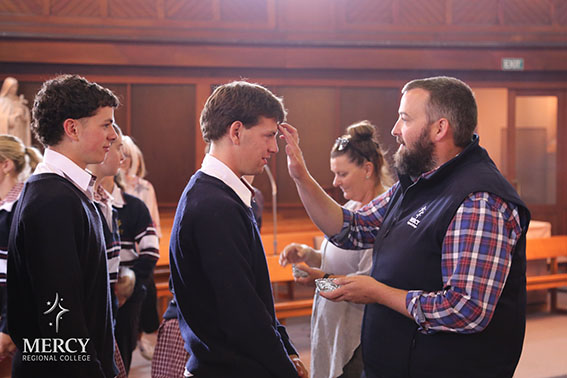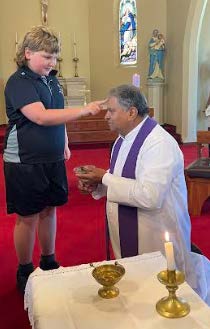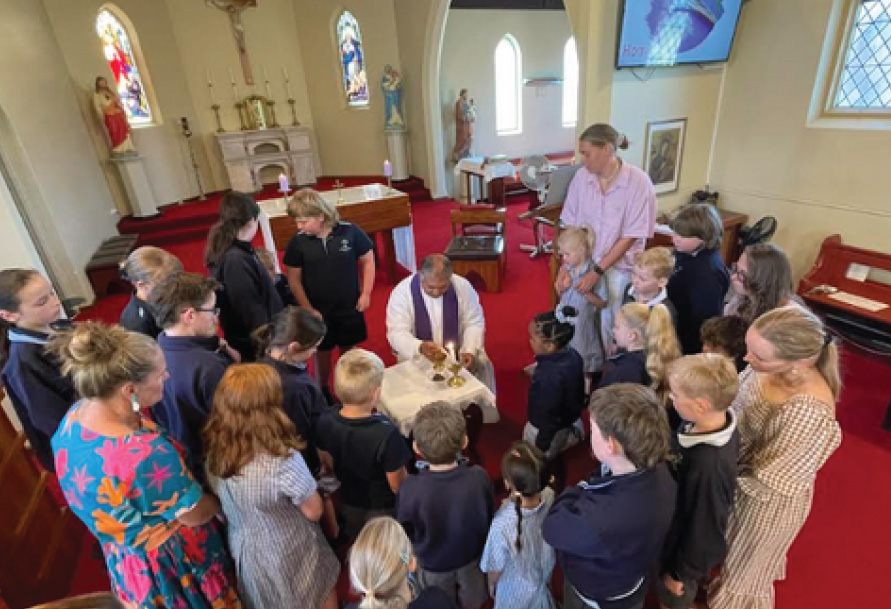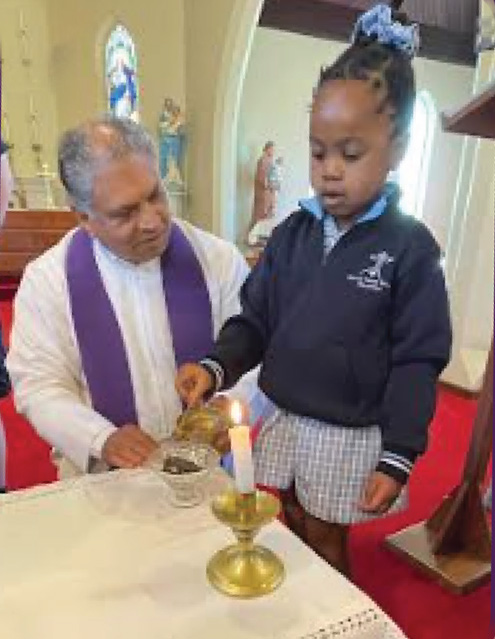 Ash Wednesday marks the beginning of the Church’s season of Lent. The marking of the ashes on our foreheads is a public expression of our faith and humility. During Ash Wednesday liturgies, ashes are typically derived from the burned palms from the previous year’s Palm Sunday. The ashes are blessed and then placed on the foreheads of the people in the form of a cross.
Ash Wednesday marks the beginning of the Church’s season of Lent. The marking of the ashes on our foreheads is a public expression of our faith and humility. During Ash Wednesday liturgies, ashes are typically derived from the burned palms from the previous year’s Palm Sunday. The ashes are blessed and then placed on the foreheads of the people in the form of a cross.
The ashes serve as a visible sign of repentance, humility, and mortality. The priest administering the ashes accompanies the gesture with the words, “repent and believe in the gospel”. This reminds us of the call to repentance and to believe in the good news. We are invited to put love in all that we think, do and act.
 Lent is a time of prayer, fasting and almsgiving. Through prayer, we come closer to God so that we are better able to realise the promises made for us at our baptism, to live justly as Jesus teaches us.
Lent is a time of prayer, fasting and almsgiving. Through prayer, we come closer to God so that we are better able to realise the promises made for us at our baptism, to live justly as Jesus teaches us.
Fasting joins us in solidarity with people experiencing poverty who often have no choice but to go without the basic human needs.
Sharing what we have, or ‘almsgiving’, is a sign of our commitment to justice and our thanks for all that God has given us. 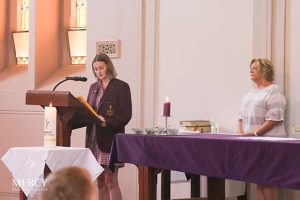 Providing an opportunity for people to draw closer to God, cultivate a spirit of self-discipline, and reflect on the life and teachings of Jesus.
Providing an opportunity for people to draw closer to God, cultivate a spirit of self-discipline, and reflect on the life and teachings of Jesus.
Lent prepares us for the season of Easter, the most important time in the Church’s calendar. By praying, fasting and giving alms, we are reminded of Jesus’ death and resurrection. Jesus brought the promise of hope to all people so that we may, “have life and have it to the full” (John 10:10). As we live into that fullness, may we also be challenged to act with love and hope, now and for all future generations.
Adapted from resources found at https://www.caritas.org.au/resources and https://willowpublishing.com.au/what-is-ash-wednesday/
Photos above from Mercy Regional College Camperdown
Damascus College’s Ash Wednesday
Damascus College marked the beginning of Lent with liturgy services for staff and students, whether they were on campus, at camp or enjoying a reflection day.

Bishop Paul’s Homily from Ash Wednesday Mass – Ballarat Cathedral, 2024
Next month, our Diocese of Ballarat will turn 150. It was on March 30, 1874, that Pope Pius the Ninth issued a decree that marked the beginning of the Ballarat Diocese. So, March 30 this year will be our 150th birthday.
When we celebrate a birthday, we often reflect on the years that have passed, as well as wishing the person happiness in the present and blessings for the time ahead. Celebrating the anniversary of a diocese is something like that. It provides an occasion to reflect on the past, affirm people in the present and look hopefully to the future. We’ll include all these elements in our celebration of the 150th anniversary of the diocese in the course of this year.
In this first part of the year, during the season of Lent, we’ll have some prayers focussing on the years gone by. It’s an opportunity to reflect on our history. In a spirit of gratitude, we can give thanks for all the blessings of these years. In a Lenten spirit of repentance, we can ask forgiveness for the failings. We can acknowledge both strengths and weaknesses. We can celebrate the achievements and recognise the failures to live our Christian faith to the full.
The first of the Scripture texts chosen for the start of Lent is from the prophet Joel. It’s a challenging text – calling us to turn away from sin and turn to God. At the same time, it’s a very encouraging text. The prophet assures us that when we do turn to God, we’ll find that God is ready to welcome us with mercy and kindness. “Turn to the Lord your God again, for he is all tenderness and compassion.”
In the psalm we call on God’s mercy, praying that God will forgive our sins. “Have mercy on me, God, in your kindness. In your compassion blot out my offence. Be merciful, O Lord, for we have sinned.”
May this season of Lent be a time of repentance for each one of us. May it be a time of repentance for us all as a diocesan community. May God grant each one of us a new heart and a new spirit. May God grant a new heart and a new spirit to our whole diocese. May we live more and more as a truly Christian community, a community of communities, from the Murray to the sea.
Fr John McKinnon prepared homily notes which also can be read below:
We celebrate Ash Wednesday — an ancient observance with ancient practices. For the Church, Lent is a time of personal rejuvenation and review. In his Sermon on the Mount, Jesus spoke of three common Jewish [at least] practices with a very long history: almsgiving, prayer and fasting. As we move into a new “era” from our forebears, can we keep these practices relevant? Jesus criticised the approach of those of his day whom he referred to as “hypocrites” for trivialising the practices and, consequently, totally missing their purpose.
How do we respond as we stand on the threshold of the approaching era?
Almsgiving today can take shape in “the preferential option for the poor”, whether poor nations, poor social groupings and even poor individuals. In a democratic world, it is a thoroughly political challenge. We cannot approach almsgiving realistically today without acting responsibly in our wider, mutually connected, increasingly politicised world?
In Australia, since just after Vatican II, we Catholics have had Project Compassion. Its founding vision was truly commendable. It still is. Over time, it was administered [and extended] by what was then called “Australian Catholic Relief”. Later it began to collaborate with other similar bodies internationally, and changed its name to “Caritas”. It is still a body that the Church can be proud of; but we can ask the question, however: “Is it enough?”
Prayer, too, in Jesus’ day had also become trivialised by many and its purpose forgotten. What Jesus had to say then can still be said today: “When you pray go to your private room and when you have shut your door, pray to your Father who is in that secret place…”. There is still a significant place for communal prayer in the life of the Church, but private prayer remains irreplaceable. Prayer has seen a wonderful renaissance since Vatican II, and has succeeded in re-shaping numerous religious congregations and seminaries, and has stretched out beyond them to a number of lay groups and individuals. But meditative and contemplative prayer still remains a well-kept secret for many faithful parishioners. The only prayer many people are really familiar with is the Rosary — though Mary herself seems to have been more devoted to letting life touch her with its questions and wonder, to treasure her experiences and to ponder them alone with her God.
Fasting, too, can be a great way to alert ourselves to the deeper truths that “enough is enough”, that “small is beautiful”. Recently we have been confronted by the fact that the world we live in is a finite, delicate, world on which we are all dependent. Everything in our world is ecologically interconnected. Our natural resources are all limited. Many of them have been greedily exploited, particularly since the Industrial Revolution. We are destroying our atmosphere, exhausting our mineral and forest reserves, polluting our oceans. We are running out of time. We have to learn, and learn quickly, to live responsibly and frugally in our current world.



